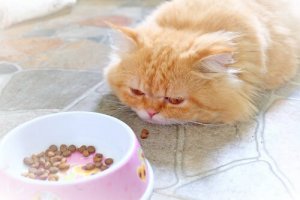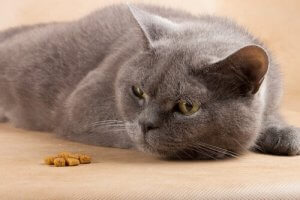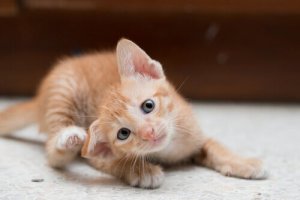Caring for Your Sick Cat: Diet and Nutrition

Not all cats should eat the same type or the same amount of food. Their diet will vary depending on their age, weight, gender, and health. As such, cat food should be chosen on a case by case basis. This becomes even more important when it comes to feeding a sick cat, as careful dietary management often forms a key part of treating and controlling disease.
The importance of choosing the right diet for your sick cat
Certain diseases in cats and dogs require a carefully controlled diet in order to manage the condition, slow down its progression, or prevent problems from occurring again in the future. The presence or absence of certain key nutrients, a higher or lower calorie content, or a specific dietary composition can be the key to a good quality of life.
Feeding a cat with kidney disease
Renal problems are very common in cats, and require special dietary management to reduce damage to the kidneys. In this case, you must limit the amount of protein, phosphorus and sodium present in food.
You can add Omega 3 fatty acids to renal diets to improve blood flow to the kidneys, along with B complex vitamins. The amount of carbohydrates is also increased to maintain energy levels and reduce protein metabolism to take the strain off the kidneys.
Caring for your sick cat – feeding cats with diabetes
Diabetes management cat foods are rich in protein and fiber, and low in carbohydrates and fat. This type of diet aims to prevent obesity and reduce blood glucose levels. In some cases, owners can also give cats arginine supplements to stimulate insulin secretion.
Feeding cats with joint problems
Older cats are very prone to joint problems. To reduce joint pain and slow degeneration, experts recommend pet foods that are rich in omega 3 and omega 6 fatty acids, which act as anti-inflammatories. Eicosapentaenoic and other cartilage precursors are also added to food as preservatives.
Joint care pet foods are usually low in fat and energy, and supplemented with L-carnitine to help maintain a healthy weight. Obesity can put unnecessary strain on joints, increasing pain, and discomfort. These foods will also contain lower quantities of protein, calcium, phosphorus, and sodium, making them ideal for older animals.

Caring for your sick cat – feeding cats with kidney stones
By carefully managing their diet, you can help to reduce the risk of kidney stones in your cat. To do this, it’s important to restrict certain minerals involved in the formation of struvite and calcium oxalate crystals. As in cats with kidney disease, the amount of protein should also be limited. In addition, specially formulated foods can modify the pH of the urine to prevent these minerals from crystallizing.
- Cats that are prone to struvite crystals should be fed food that increases urine acidity.
- Alkalizing pet foods are best for cats that have oxalate crystals in their urine.
These cat foods often have added vitamin E and carotenes. These antioxidants neutralize free radicals and help fight urolithiasis.
Feeding cats with food allergies
You can buy special pet foods for cats with food allergies or intolerances. These contain highly digestible proteins such as salmon, eggs, and duck. They also contain only the least reactive sources of carbohydrate, like potatoes, rice, and corn… Alternatively, you could opt for pet foods with hydrolyzed proteins.
You can also increase the amount of fatty acids and antioxidants in their diet, which will help keep their skin and coat healthy.

Caring for your sick cat – feeding cats with digestive issues
For cats suffering from diarrhea or vomiting (either regularly or periodically), it’s best to feed them an easily digestible diet that’s low in fat, and high in fiber to restore the balance of the intestinal flora. Electrolytes and vitamins can also be added to compensate for any nutrients lost.
Not all cats should eat the same type or the same amount of food. Their diet will vary depending on their age, weight, gender, and health. As such, cat food should be chosen on a case by case basis. This becomes even more important when it comes to feeding a sick cat, as careful dietary management often forms a key part of treating and controlling disease.
The importance of choosing the right diet for your sick cat
Certain diseases in cats and dogs require a carefully controlled diet in order to manage the condition, slow down its progression, or prevent problems from occurring again in the future. The presence or absence of certain key nutrients, a higher or lower calorie content, or a specific dietary composition can be the key to a good quality of life.
Feeding a cat with kidney disease
Renal problems are very common in cats, and require special dietary management to reduce damage to the kidneys. In this case, you must limit the amount of protein, phosphorus and sodium present in food.
You can add Omega 3 fatty acids to renal diets to improve blood flow to the kidneys, along with B complex vitamins. The amount of carbohydrates is also increased to maintain energy levels and reduce protein metabolism to take the strain off the kidneys.
Caring for your sick cat – feeding cats with diabetes
Diabetes management cat foods are rich in protein and fiber, and low in carbohydrates and fat. This type of diet aims to prevent obesity and reduce blood glucose levels. In some cases, owners can also give cats arginine supplements to stimulate insulin secretion.
Feeding cats with joint problems
Older cats are very prone to joint problems. To reduce joint pain and slow degeneration, experts recommend pet foods that are rich in omega 3 and omega 6 fatty acids, which act as anti-inflammatories. Eicosapentaenoic and other cartilage precursors are also added to food as preservatives.
Joint care pet foods are usually low in fat and energy, and supplemented with L-carnitine to help maintain a healthy weight. Obesity can put unnecessary strain on joints, increasing pain, and discomfort. These foods will also contain lower quantities of protein, calcium, phosphorus, and sodium, making them ideal for older animals.

Caring for your sick cat – feeding cats with kidney stones
By carefully managing their diet, you can help to reduce the risk of kidney stones in your cat. To do this, it’s important to restrict certain minerals involved in the formation of struvite and calcium oxalate crystals. As in cats with kidney disease, the amount of protein should also be limited. In addition, specially formulated foods can modify the pH of the urine to prevent these minerals from crystallizing.
- Cats that are prone to struvite crystals should be fed food that increases urine acidity.
- Alkalizing pet foods are best for cats that have oxalate crystals in their urine.
These cat foods often have added vitamin E and carotenes. These antioxidants neutralize free radicals and help fight urolithiasis.
Feeding cats with food allergies
You can buy special pet foods for cats with food allergies or intolerances. These contain highly digestible proteins such as salmon, eggs, and duck. They also contain only the least reactive sources of carbohydrate, like potatoes, rice, and corn… Alternatively, you could opt for pet foods with hydrolyzed proteins.
You can also increase the amount of fatty acids and antioxidants in their diet, which will help keep their skin and coat healthy.

Caring for your sick cat – feeding cats with digestive issues
For cats suffering from diarrhea or vomiting (either regularly or periodically), it’s best to feed them an easily digestible diet that’s low in fat, and high in fiber to restore the balance of the intestinal flora. Electrolytes and vitamins can also be added to compensate for any nutrients lost.
All cited sources were thoroughly reviewed by our team to ensure their quality, reliability, currency, and validity. The bibliography of this article was considered reliable and of academic or scientific accuracy.
- McDonald, Edwards Grennhalgh y Morgan. Nutrición animal.Zaragoza, Editorial Acribia, 1995.
- Hand, Tharcher, Remillard y Roudebush. Nutrición clínica en pequeños animales. Buenos Aires; Panamericana, 2000.
This text is provided for informational purposes only and does not replace consultation with a professional. If in doubt, consult your specialist.








